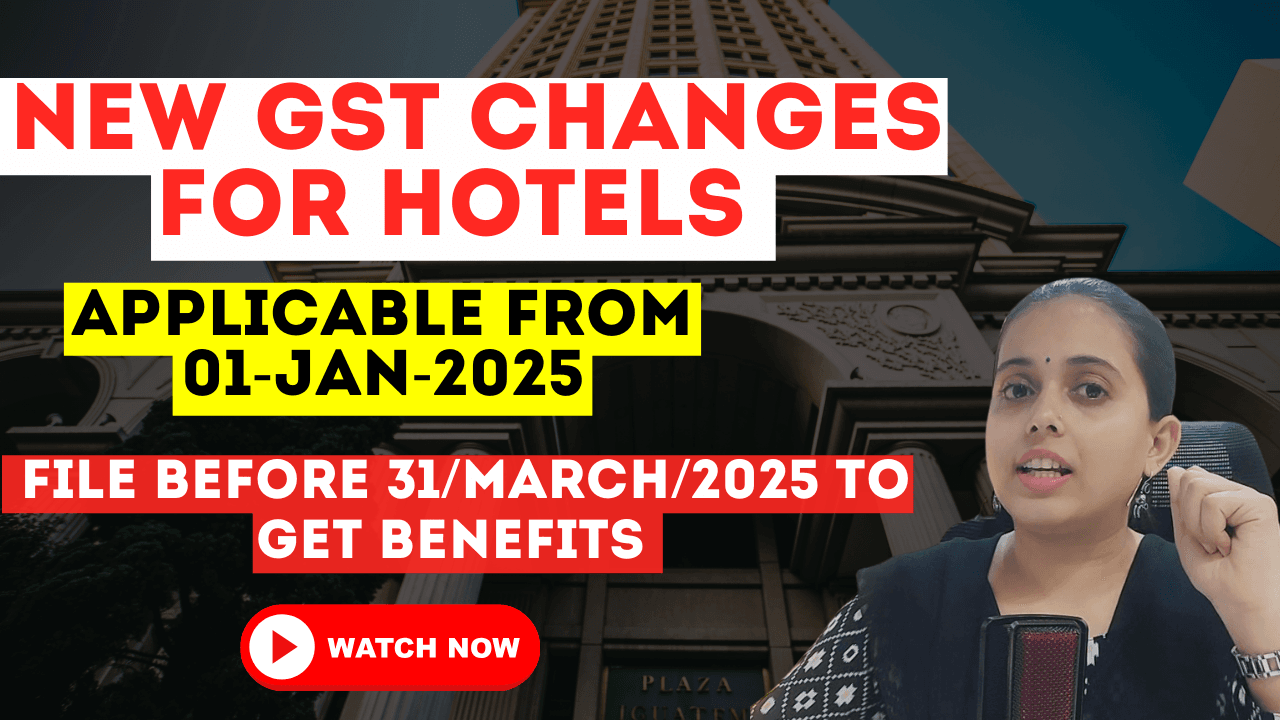New GST Changes for the Hotel Industry
The Goods and Services Tax (GST) landscape for the hotel and hospitality industry has undergone significant changes effective from January 1, 2025. These changes include a revised definition of “specified premises,” modifications in the Reverse Charge Mechanism (RCM), and updated guidelines for claiming Input Tax Credit (ITC). One of the most crucial aspects is the requirement for businesses to file declarations by March 31, 2025, to claim these benefits.
In this blog, we will explore these changes in detail and help you understand how they impact your business operations, tax obligations, and overall profitability.

- Revised Definition of “Specified Premises”
One of the most critical changes in the new GST regulations is the revised definition of “specified premises.” This affects how businesses categorize their services and determine the applicable GST rate.
What Has Changed?
- Previously, premises were classified based on certain criteria, but the revised definition broadens the scope.
- Businesses providing accommodation services must carefully analyze their operations to determine the correct GST category and rate.
- The new definition impacts not only GST rates but also Input Tax Credit (ITC) eligibility.
Impact on Businesses:
- Accommodation services with room tariffs above a specified threshold now face different tax rates and conditions for claiming ITC.
- Incorrect classification can lead to compliance issues, penalties, and financial losses.
- Updates in the Reverse Charge Mechanism (RCM)
The Reverse Charge Mechanism (RCM) is another area that has seen significant changes, particularly affecting transactions with unregistered suppliers.
Key Changes:
- Businesses must now pay GST on certain expenses incurred from unregistered vendors under RCM.
- The introduction of RCM for unregistered suppliers complicates tax management for businesses, especially small hotels and restaurants.
Implications for Financial Planning:
- Increased cost structures for businesses relying on unregistered vendors.
- Businesses must ensure they comply with RCM requirements to avoid penalties.
- The exclusion of specific composite dealers from RCM requirements provides relief for some businesses.
- Input Tax Credit (ITC) Challenges and Opportunities
One of the major concerns for businesses in the hospitality industry is the inability to claim ITC in certain cases, especially when charging 5% GST on accommodation services.
Challenges:
- Accommodation services with tariffs below ₹7,500 per day that charge GST at 5% cannot claim ITC.
- This leads to reduced profitability and increased financial strain on businesses that cannot offset their input costs.
New Benefits Introduced:
- The recent changes allow businesses to declare specified premiums even for room charges below ₹7,500, enabling them to claim ITC benefits without raising their prices.
- This is a welcome relief for small and mid-sized hotels.
- Filing Declarations by March 31, 2025
The declaration filing requirement is a crucial part of the new regulations. Hotels and restaurants must file the necessary forms by March 31, 2025, to claim the benefits introduced by these changes.
Steps for Filing Declarations:
- Analyze your business operations to determine if you qualify for the new benefits.
- Ensure that your premises meet the revised definition of “specified premises.”
- File the declaration using the prescribed forms provided in the January 16 GST notification.
- Maintain accurate records to support your declaration and claims.
- Tax Category Options for Hotel Businesses
The recent changes provide flexibility for businesses to choose the most suitable GST category based on their operations. This allows businesses to opt for different tax regulations to optimize their tax obligations and financial outcomes.
Considerations for Choosing the Right Category:
- Evaluate your annual turnover and room tariff structure.
- Determine whether claiming ITC benefits outweighs the reduced tax rate.
- Understand the implications of opting out of certain GST categories.
- Key Takeaways for the Hotel Industry
- Stay Informed: The hotel industry must remain updated on GST notifications and changes to ensure compliance and maximize benefits.
- Review Business Operations: Analyze your services and pricing structure in light of the revised definition of specified premises.
- File Declarations on Time: Missing the March 31, 2025 deadline can result in lost benefits and penalties.
- Seek Professional Guidance: Understanding the complexities of RCM, ITC, and filing declarations may require the assistance of tax professionals.
Conclusion
The recent GST changes for the hotel industry are aimed at streamlining compliance and addressing some of the challenges faced by businesses. However, these changes also introduce complexities that require careful planning and timely action.
Hotels and restaurants must understand the revised rules, evaluate their business structure, and file the necessary declarations by March 31, 2025, to fully benefit from the new regulations. Proper compliance can help businesses reduce costs, improve profitability, and avoid penalties.
Stay tuned for more updates on GST and compliance tips for the hospitality industry.
For better understanding watch – https://youtu.be/9Wb_pc8_eT8
Let me know if you want to add examples, declaration forms, or infographics to make this blog even more comprehensive!
For More Information : https://taxgyany.com/

